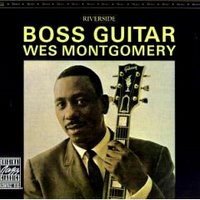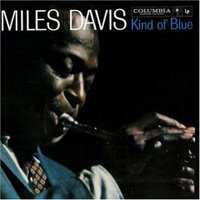Boss Guitar - Wes Montgomery

Not everybody can pull off a opening vamp like the one for Besame Mucho - but Mel Rhyne & Jimmy Cobb make it happen. For that matter, not many can pull off a tune like Besame Mucho, but Wes, Mel & Jimmy are just the guys for the job.
Boss Guitar is one of Wes Montgomery's classic Riverside albums - a must-have for any guitarist, jazz player or not. Apart being a tour de force on the guitar, this record also highlights Wes' great ability to take tunes like Besame Mucho - that can be painfully square if one isn't careful - and make them respectably hip. After all, it's not the song, but how you play it - an art Wes had clearly mastered (some of his later work, like Tequila notwithstanding, but that's another story...)
Besame Mucho isn't the only such potentially hazardous "ole chestnut" on this record. Canadian Sunset and Dearly Beloved can be easily mishandled, and oftentimes have at the hands of less gifted musicians. Wes, however, simply simmers his way through these more uptempo numbers (the choice of these tempos doesn't hurt the hipness quotient) with his characteristic aplomb. One of the great hallmarks of Montgomery's virtuosity is the effortlessness with which he plays, particularly at medium to up tempos. Not just his much-lauded switching from single note lines to octaves and on to chord solos, but the ease and melodicism which which the solos flow, all technical prowess aside.
Listen closely to Wes' lines and melodies: like Miles and Bird solos, these lines has a certain inevitable quality, playing out the way they do as if by destiny, as if there was no better way to do so. Wes has a uncanny knack for getting lines to "land on their feet" no what what unexpected twists and turns they may take on the way. Also evident on these tunes - Dearly Beloved and Canadian Sunset especially - is Wes ' remarkable ability to interject and punctuate open, soaring melodies with blues phrases that are organic parts of the line, and not hackneyed cliches. (No wonder Montgomery was Trane's pick as a guitarist for his early 60s group).
The tune that really takes the "chestnut" prize on this record is Dearly Beloved. Talk about a number that's no picnic to pull off - take any tune at a tempo this slow, and most groups are asking for trouble. Add to that the fact that half of your rhythm section is an organist, and most listeners will be dozing off before you're done counting in the opening bar... Again, the group (Wes in particular) rises to occasion and makes it work. Mel's solo has a few faltering moments on the harmonic thin ice, but overall, Mel's the man on this tune, his accompaniment sustaining the momentum of the piece and doing a lot to define the mood. Jimmy Cobb's tastefully obsequious playing doesn't hurt either.
Boss Guitar (Riverside RLP 459)
Plaza Sound Studios, NYC
April 22, 1963



